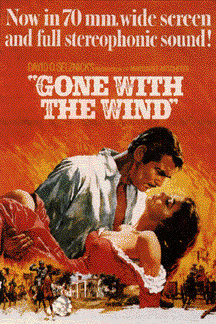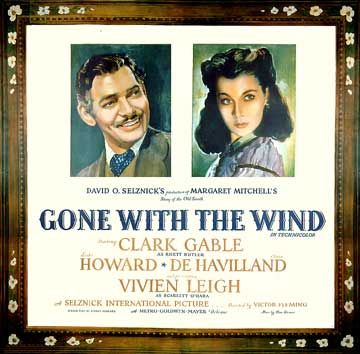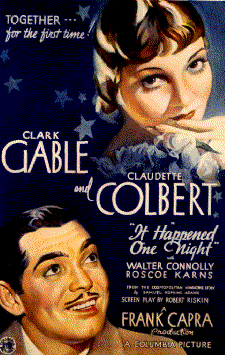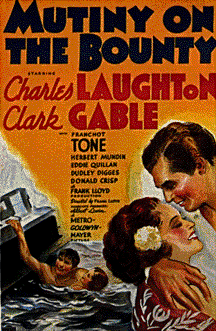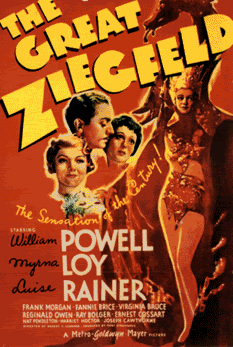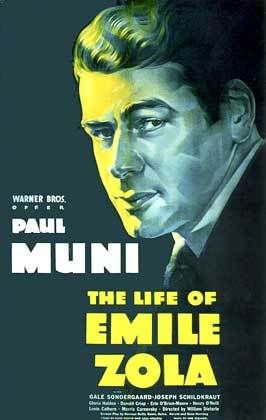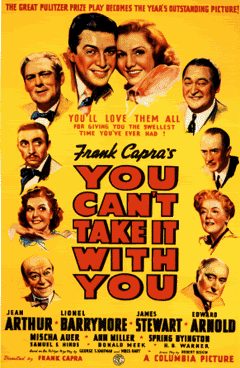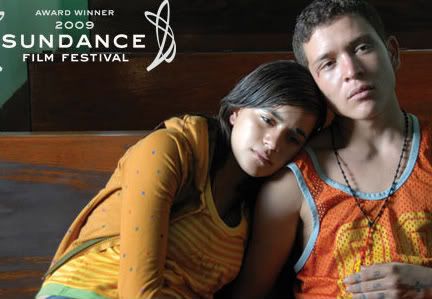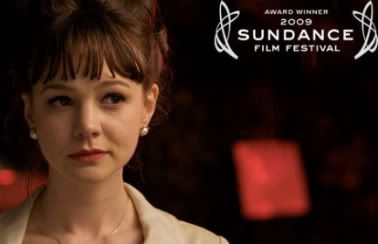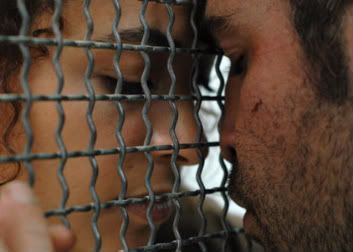#13: Rebecca (1940)
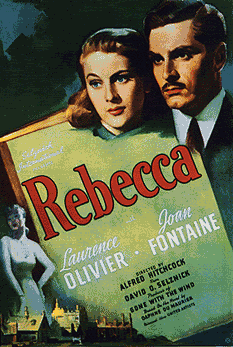
Winner Best Picture, 1940
Watched on: 10/3/2009
Erika and I sat down for a mini-marathon back in October, and Rebecca was first on the agenda. Shockingly, this film was not available on DVD, at least not via Netflix, and if I remember correctly, I couldn't find it on DVD elsewhere either, so I bought it on VHS. So that's completely baffling -- how is it that one of the great Alfred Hitchcock films isn't on DVD? Fairly ridiculous, if you ask me. I'd seen Rebecca before, and I'd also read the original book by Daphne du Maurier a couple times in the past, so I knew that I would enjoy watching it again. It's definitely one of my favorite old movies, and it's such a pleasure when a movie I already love won for Best Picture, because then I get to watch it again as a part of this project. For entirely pleasurable Gothic mystery and suspense, Rebecca can't be beat. I could watch this one again and again. It looks like you can catch it on TCM coming up in early February, and I'd highly recommend doing so, if you've never seen it before - or even if you have.
#14: How Green Was My Valley (1941)
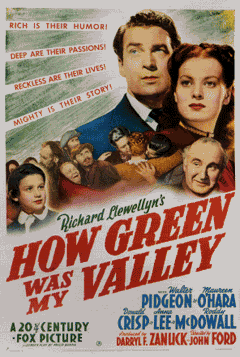
Winner Best Picture, 1941
Watched on: 10/3/2009
Hollywood seemed to really love a sentimental epic in these days, and How Green Was My Valley is certainly that. This is another film that I almost certainly would never have picked up on my own if I hadn't been doing this project, but in the end, I think I'm glad to have seen it. The tale of a family facing the gradual disintegration of life in a Welsh coal-mining town doesn't seem very new to us nowadays, but I suppose it was a fresher story when this came out, and at any rate, exploring the human ramifications of such a decline is a story that people want to hear again and again. I suppose you could easily modernize this tale and transport it from the Welsh hills to the crumbling American car industry on the current streets of Detroit, and it could likely play again with some success. How Green Was My Valley was a decent film overall, but its Best Picture win is historically significant primarily due to the fact that it beat out Citizen Kane and The Maltese Falcon. Certainly, in hindsight, its win probably wasn't entirely deserved, but I guess that's what makes this project so interesting from a sociological standpoint as well -- Academy Award wins are subject to their times, the political moods, reactions to past ceremonies, the sentiments and emotions of their days. On the heels of the Great Depression and the brink of another World War, when World War I was supposed to have been the War to End All Wars, it's is easy to see why a nostalgic film yearning for the earlier, better days of family, hearth, and home might have taken the prize.
#15: Mrs. Miniver (1942)
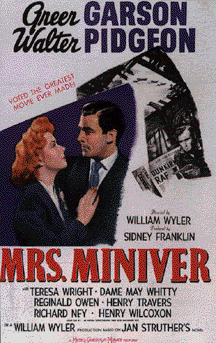
Winner Best Picture, 1942
Watched on: 10/3/2009
I did not find Mrs. Miniver particularly memorable. In fact, when I first thought of sitting down to write about it after a three month lag time, I had to look it up to jog my memory on the plot. I wouldn't say that Mrs. Miniver is a terrible movie by any means, it just didn't really stick with me all that much. It's the story of a British family in World War II, and it could probably best be described as propaganda. I think that during World War II, in particular, a number of the Best Picture wins had as much to do with what was going on in the world and the films' places in that context as they did with the quality of the films themselves. Honoring this film was definitely something akin to buying bonds, or starting a victory garden, or turning in one's jewelry to be melted down for the war effort. Again, it's not a bad film by any means, but it just didn't stick in my mind as a great film by any means either. I did like Greer Garson in it, but I think she's just generally a pretty good actress. I'd be interested to hear what Erika remembers or says about it -- it's the last of our mini-marathon films. Perhaps she'll read this and comment. You can catch it on TCM on February 26th and see what you think for yourself.
#16: Casablanca (1943)
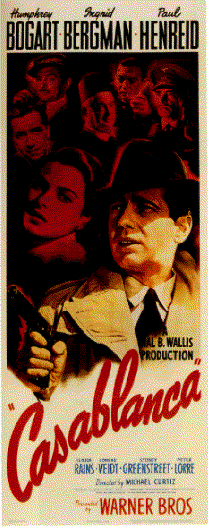
Winner Best Picture, 1943
Watched on: 12/27/2009
Well, Mrs. Miniver may not have been all that memorable to me, but Casablanca is one of my most memorable films of all time for the same reason it winds up being on most people's most memorable movies of all time lists -- it is a truly great film. Yes, it too is a product of its times, it too is a movie about World War II and taking a stand for what is right, but it does it all without being propaganda. Incredible writing, fantastic acting, an interesting and unique plot, and great lines, ones you know even if you've never seen the film and you don't know how or why, they've just worked themselves into our collective consciousness -- "Here's looking at you, kid" and "Play it again, Sam" and "We'll always have Paris" and....well, do I need to go on? If you've never seen Casablanca, you need to stop what you're doing, procure a copy, and watch it immediately. And if you have (which I assume is most everyone?), see it again, such a pleasure to revisit. You can also catch it on TCM on February 14th (very fitting) and March 8th.
#17: Going My Way (1944)
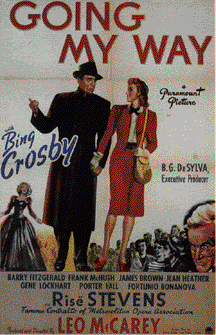
Winner Best Picture, 1944
Watched on: 12/28/2009
It seems fairly well-accepted that Going My Way won the Best Picture award in 1944 because the war-weary nation needed its sentimental and uplifting tale, not to mention the beautiful croonings of Bing Crosby. And I'll tell you what, they were on to something there, at least. What a voice - I could listen to that man sing all day. It's a film people would use words like "heartwarming" to describe, for which other, more cynical people might substitute words like "sappy" -- and they'd both be right. I didn't care, I just went along with it, and when the predictable, heartwarming, sappy, sentimental ending came along, I cried during it just like I was supposed to. Well, why not? Everyone could use a movie like this now and again, and when it's reasonably well-done like Going My Way was, with Bing Crosby numbers on top of that, why not just sit back, take off the critical hat, and just feel good like you're supposed to? Because, heck, we'd all like to swing on a star and carry moonbeams home in a jar too, right?
#18: The Lost Weekend (1945)
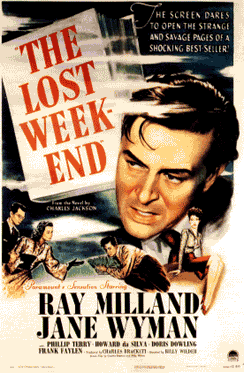
Winner Best Picture, 1945
Watched on: 12/29/2009 and 12/31/2009 in two sessions
The contrast of watching Going My Way and The Lost Weekend back-to-back comes as a shock to the system strong enough not to rival but perhaps to prepare you for some of the ones the main character of The Lost Weekend experiences as he spends a long weekend in an out-of-control, alcoholic downward spiral. This was the first film to deal with the subject of alcohol addiction as an illness, and the effects of that illness on those who suffer it and the people in their lives. There's nothing entertaining or uplifting about this film, though the ending does bring hope, though it's a bit of one of those too-easy Hollywood endings, so you just hope it can be true - it would have been more uplifting had it been more realistic. It was certainly an important film, probably one that had to be made and seen in order to shine a light on a social problem that was very little understood at the time. It's worth seeing, knowing that it tackled a taboo subject, and that the alcohol industry actually tried to buy the negatives and prevent its release (though of course it subsequently applauded its success -- a bit of an early precursor to the "Please Drink Responsibly" disclaimers the alcohol industry uses nowadays?)
#19: The Best Years of Our Lives (1946)
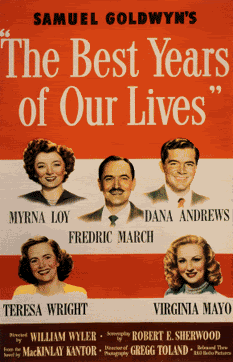
Winner Best Picture, 1946
Watched on: 12/31/2009
I liked The Best Years of Our Lives very much. A movie about the struggles and difficulties of three very different men who return to the same hometown at the same time after World War II, I found it to be very straightforward, realistic, and human. No hint of propaganda, no glossing over the difficulties, just a reasonably honest portrayal of the different problems each man (and the people in their lives) faced as they tried to adjust themselves to lives that could never be the same. Each of their stories, along with the ways in which they intertwined, were poignant without being sappy. It follows the bank executive who likes to drink a little too much after his return, and who can't be as ruthless in denying loans to the honest GIs who served with him as his employers would like him to be. The Air Force captain who was a soda jerk before the war finds himself unqualified for anything else afterwards, despite the large salary and respect he earned in wartime -- and stuck with a wife he knew for only 20 days, who'd never seen him out of uniform, and with whom it becomes increasingly obvious that he has nothing in common. And finally, you see the most painful adjustment of the young navy seaman, a former high school athlete, engaged to the faithful girl-next-door, who must find his way after losing both of his hands to an explosion, using two hooks instead. It seems to me that, nowadays, looking back, a lot of people want to believe that WWII veterans came home and just "got on with their lives" - and certainly, they did have to get on with their lives, but I liked the fact that this film portrayed much more nuance than that, and it wasn't so simple. Looks like you can catch The Best Years of Our Lives on TCM on February 2nd.
#20: Gentleman's Agreement (1947)
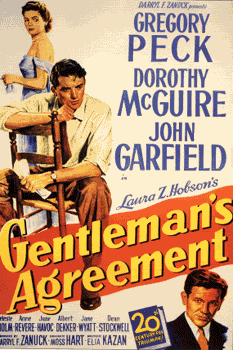
Winner Best Picture, 1947
Watched on: 1/1/2010
For me, Gentleman's Agreement had a few things going for it right off the bat. For one thing, it's main character was played by Gregory Peck who is (little-known fact) my Old Movie Boyfriend. Man, I love that guy. You can keep your Clark Gables and Cary Grants -- I'll take some Gregory Peck over them any day! Secondly, I love any movie (or play or book or song or piece of art) that fights injustice and intolerance. And so what an important movie! It's been noted that there were a lot of socially conscious themes in the post-war years, and of course this is no exception. But more than some of its predecessors, this was an incredibly brave film, one that a lot of people didn't want to see made. A lot of Americans wanted to believe that anti-Semitism was not, could not be, an American problem. After all, Americans fought Hitler, Americans shut down the extermination and concentration camps and freed the Jews in Europe. The film does hit you over the head with its message a bit, but I still love that it ripped the band-aid off and said, "examine yourselves." It is also very interesting within the context of the McCarthy Hearings on Communism in Hollywood in years to come -- the director, Elia Kazan, very famously and controversially named eight people in Hollywood as members of the Communist party; actress Anne Revere refused to testify and was blacklisted for nearly 20 years; and actor John Garfield died of a heart attack, allegedly from the stress of the proceedings, to name a few. It would seem that either being Jewish or being involved in projects that called attention to anti-Semitism made it much easier for one to be labeled as a Communist. My main beef with Gentleman's Agreement was that I didn't really buy the romance. It seemed absurd that two people would become so close (and in fact become engaged) within about sixty seconds of meeting each other, particularly since there was a child involved (the main charatcter was a widower). Of course, their relationship introduced interesting difficulties and twists as the reporter (who is posing as a Jewish man writing an article on anti-Semitism for a couple months) is faced with some of his fiancee's prejudices, or rather crimes of omission, of being a "nice" person who doesn't like anti-Semitism but quietly tolerates it (which is, of course, the gentleman's agreement). That was all fine, but the pat ending in which she sees the error of her ways and reforms lickety-split and they plan to live happily ever after just didn't ring true to me -- I would have much preferred him to realize that the straightforward female friend, with whom he has much in common, and who shares his staunch idealism and refusal to tolerate prejudice, was the gal for him. Ah well, perhaps that's for a different movie about sexism?
#21: Hamlet (1948)
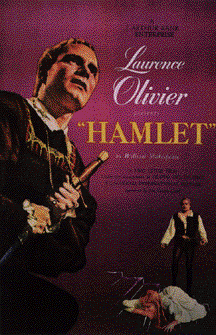
Winner Best Picture, 1948
Watched on: 1/1/2010
I didn't really have great expectations for Hamlet (ha, see what I did there? A Dickens reference in a Shakespeare review -- I slay me!) I've tended to have mixed feelings about film adaptations of Shakespeare plays in general. I like them best on the stage, where I think they really belong, and for me, the film versions that are most successful are those that retain certain play-like qualities. (I loved the Leonardo DiCaprio/Claire Dains Romeo and Juliet precisely because it managed to capture an intangible sense of stage, an other-worldly vibe, representing life in some alternate universe, not realistic life -- but I digress.) I kind of feel like this movie won the Academy Award because the Academy sort of scratched its head and said, "Well, it's Shakespeare, I guess we'd better give it the award?" It did maintain a simple set, and retain a lot of qualities of the stage, which I certainly appreciated, and it's never a bad thing to hear the great words of Shakespeare's Hamlet again (another case of so many lines that have wormed themselves into everyday lingo -- also, if you're familiar with Hamlet, feel free to enjoy my gratuitous "worm" reference here). I did think Olivier was a little old to realistically play Hamlet (but what's new, that happens all the time, sheesh, think of Emma Thompson in Sense and Sensibility!), and some things were a bit overdone (Ophelia's madness springs to mind). All-in-all, it's an okay adaptation of Hamlet, I just wasn't particularly thrilled. Though I did get a pretty good chuckle at the codpieces in the big sword-fighting scene with Laertes, but I suppose that's because I'm a little juvenile.
#22: All the King's Men (1949)
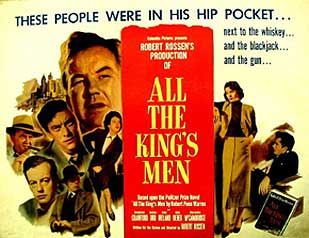
Winner Best Picture, 1949
Watched on: 1/2/2010
Here's another film I almost certainly wouldn't have selected if left to my own devices, though it is an interesting political drama about a Louisiana politician who starts out as an naive "hick" (as he refers to himself) seeking honesty and justice, and then rises to power and the governorship of Louisiana through increasingly unscrupulous means, with corruption, browbeating, cover-ups, and possibly even murder on his hands along the way. I guess that All the King's Men is based loosely on the real-life story of Louisiana governor and then Senator Huey Pierce Long. It's a little weird, I guess, but even though I watched All the King's Men only today, I don't really have all that much I can think of to say about it. I guess you could watch it on February 19th or March 14th on TCM and form your own opinions. The only thing I take away from a film like this is my own possibly naive hope that there isn't this much corruption and dishonesty in all of politics. Well, that, and I'm interested in watching the 2006 Sean Penn film, I think it would be interesting to contrast the two.
WHEW. Well, that's it! A decade of Best Picture films! Perhaps next time I shouldn't wait so long to write about them all, as this has taken me a few hours to put together. But at least I've picked up some steam in my viewing -- perhaps it won't take me the rest of my life to get through all these films!
